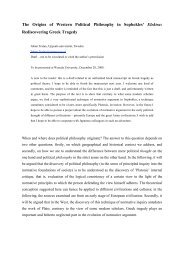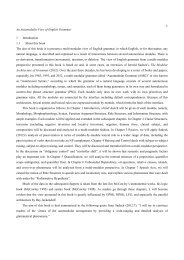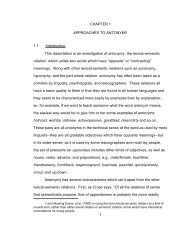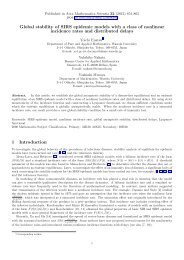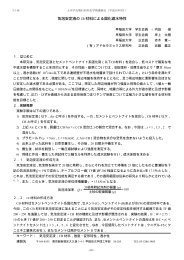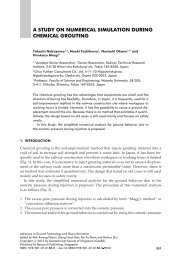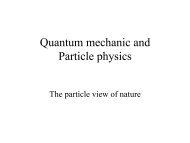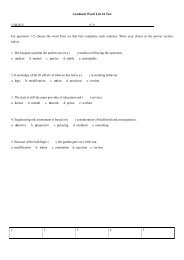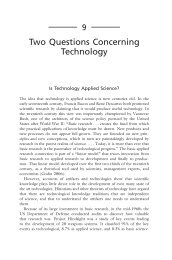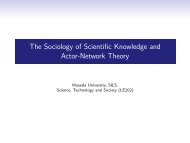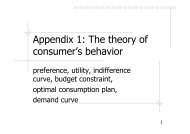The strong program of sociology of knowlege
The strong program of sociology of knowlege
The strong program of sociology of knowlege
- No tags were found...
You also want an ePaper? Increase the reach of your titles
YUMPU automatically turns print PDFs into web optimized ePapers that Google loves.
Strong Programme and Sociology <strong>of</strong> Knowledge 49Actors and observers normally do not feel or see the open-endednessthat finitism creates. According to Barnes and Bloor, this is because differentkinds <strong>of</strong> social connections fill most <strong>of</strong> the gaps between past practices andtheir extension to new cases. That is, since there is no logic that dictateshow a term, classification, or rule applies to a new case, social forces pushinterpretations in one direction or another. This “sociological finitism”(see Box 5.1) opens up a large space for the <strong>sociology</strong> <strong>of</strong> knowledge! AsBloor says:Can the <strong>sociology</strong> <strong>of</strong> knowledge investigate and explain the very content andnature <strong>of</strong> scientific knowledge? Many sociologists believe that it cannot . . . <<strong>strong</strong>>The</<strong>strong</strong>>yvoluntarily limit the scope <strong>of</strong> their own enquiries. I shall argue that this isa betrayal <strong>of</strong> their disciplinary standpoint. All knowledge, whether it be in theempirical sciences or even in mathematics, should be treated, through andthrough, as material for investigation. (Bloor 1991 [1976]: 1)Box 5.1Sociological finitism<<strong>strong</strong>>The</<strong>strong</strong>> argument for finitism is a restatement <strong>of</strong> Wittgenstein’s argument aboutrules (Box 3.2). Rules are extended to new cases, where extension is a process.Rules therefore change meaning as they are applied. Classifications andthe applications <strong>of</strong> terms are just special cases <strong>of</strong> rules.<<strong>strong</strong>>The</<strong>strong</strong>> application <strong>of</strong> finitism can be illustrated through an elegant casein the history <strong>of</strong> mathematics analyzed by Imre Lakatos (1976), and reanalyzedby Bloor (1978). <<strong>strong</strong>>The</<strong>strong</strong>> mathematics is straightforward and helpfullypresented, especially by Lakatos. <<strong>strong</strong>>The</<strong>strong</strong>> case concerns a conjecture due to themathematician Leonard Euler: for polyhedra, V − E + F = 2, where F is thenumber <strong>of</strong> faces, E the number <strong>of</strong> edges, and V the number <strong>of</strong> vertices. Euler’sconjecture was elegantly and simply proven in the early nineteenth century,and on the normal image <strong>of</strong> mathematics that should have been end <strong>of</strong>the story. However, quite the opposite occurred. <<strong>strong</strong>>The</<strong>strong</strong>> pro<strong>of</strong> seemed to promptcounter-examples, cases <strong>of</strong> polyhedra for which the original theorem didnot apply!Some mathematicians took the counter-examples as an indictment <strong>of</strong>the original conjecture; the task <strong>of</strong> mathematics was then to find a morecomplicated relationship between V, E, and F that preserved the originalinsight, but was true for all polyhedra. Other mathematicians took thecounter-examples to show an unacceptable looseness <strong>of</strong> the category polyhedra;the task <strong>of</strong> mathematics was then to find a definition <strong>of</strong> polyhedra
54 Strong Programme and Sociology <strong>of</strong> KnowledgeKnowledge, Practices, CulturesFrom the perspective <strong>of</strong> many <strong>of</strong> its critics, the <strong>strong</strong> <strong>program</strong>me rejectstruth, rationality, and the reality <strong>of</strong> the material world (e.g. Brown 2001).It is difficult to make sense <strong>of</strong> such criticisms. <<strong>strong</strong>>The</<strong>strong</strong>> <strong>strong</strong> <strong>program</strong>me doesnot reject any <strong>of</strong> these touchstones, but rather shows how by themselvestruth, rationality, and the material world have limited value in explainingwhy one scientific claim is believed over another. In order to understandscientific belief, we need to look to interpretations and the rhetorical workto make those interpretations stick (Barnes et al. 1996).For other critics, the <strong>strong</strong> <strong>program</strong>me retains too much commitmentto truth and the material world. Strong <strong>program</strong>mers (e.g. Barnes et al. 1996)reject what are sometimes seen as idealist tendencies in STS. It may bethat arguments on this issue weaken STS’s commitment to methodologicalagnosticism about scientific truths – probably the <strong>strong</strong> <strong>program</strong>me’s largestcontribution to the field. Whether this is right remains an open question.Finally, the <strong>strong</strong> <strong>program</strong>me has been criticized for being too committedto the reality and hardness <strong>of</strong> the social world: it is seen as adoptinga foundationalism in the social world to replace the foundationalism inthe material world that it rejects. As Woolgar argues, there is no reason tosee interests as less malleable than anything to be explained. <<strong>strong</strong>>The</<strong>strong</strong>> critique<strong>of</strong> interests has been amplified by arguments that interests are translatedand modified as scientific knowledge and technological artifacts are made(Latour 1987; Pickering 1995). Society, science, and technology are producedtogether, and by the same processes – this results in a “supersymmetry”(Callon and Latour 1992).Since the 1970s, the pendulum in STS, and elsewhere in the humanitiesand social sciences, has swung from emphasizing structures to emphasizingagency (e.g. Knorr Cetina and Cicourel 1981). <<strong>strong</strong>>The</<strong>strong</strong>> <strong>strong</strong> <strong>program</strong>mewas <strong>of</strong>ten associated with structuralist positions, though its statements leavethis issue entirely open. Thus as a philosophical underpinning for STS the<strong>strong</strong> <strong>program</strong>me has been supplemented by others: constructivism (e.g.Knorr Cetina 1981), the empirical <strong>program</strong>me <strong>of</strong> relativism (Collins 1991[1985]), actor-network theory (e.g. Latour 1987), symbolic interactionism(e.g. Clarke 1990), and ethnomethodology (e.g. Lynch 1985). <<strong>strong</strong>>The</<strong>strong</strong>>sepositions are briefly described in other chapters. For the most part, this bookavoids anatomizing theoretical positions and disputes, except as they directlyinform its main topics, but readers interested in philosophical and methodologicalunderpinnings might look at these works and many others to see some<strong>of</strong> the contentious debates around foundational issues.
Strong Programme and Sociology <strong>of</strong> Knowledge 55Box 5.3Pierre Bourdieu and an agonistic science<<strong>strong</strong>>The</<strong>strong</strong>> French anthropologist Pierre Bourdieu (1999 [1973]) argued that wecan understand scientific achievements as resulting from the interplay <strong>of</strong>researchers on a scientific field. Bourdieu introduced the term culturalcapital, as a counterpart to social capital (a term that his use helped tomake common) and economic capital. Actors come to a field with a certainamount <strong>of</strong> each <strong>of</strong> these forms <strong>of</strong> capital, and develop and deploy them tochange their relative status within the field. This is true even <strong>of</strong> scientificfields: Bourdieu says, “<<strong>strong</strong>>The</<strong>strong</strong>> ‘pure’ universe <strong>of</strong> even the ‘purest’ science is asocial field like any other, with its distribution <strong>of</strong> power and its monopolies,its struggles and strategies, interests and pr<strong>of</strong>its.” Action in a fieldis agonistic.All scientific moves <strong>of</strong> an actor are simultaneously moves on the field:“Because all scientific practices are directed toward the acquisition <strong>of</strong>scientific authority ..., what is generally called ‘interest’ in a particularscientific activity . . . is always two-sided” (Bourdieu 1999). Every idea is alsoa move to increase capital; it is artificial to separate the pursuit <strong>of</strong> ideasfrom the social world.<<strong>strong</strong>>The</<strong>strong</strong>>re are, then, many different strategies for increasing capital. Forexample: “Depending on the position they occupy in the structure <strong>of</strong> thefield . . . the ‘new entrants’ may find themselves oriented either towardsthe risk-free investments <strong>of</strong> succession strategies . . . or towards subversionstrategies, infinitely more costly and more hazardous investments whichwill not bring them the pr<strong>of</strong>its . . . unless they can achieve a completeredefinition <strong>of</strong> the principles legitimating domination.”Bourdieu’s work is isolated from other work in STS, and has been pickedup by relatively few researchers. However, we can see his agonistic theory<strong>of</strong> science as respecting the principles <strong>of</strong> the <strong>strong</strong> <strong>program</strong>me in an individualisticway, explaining the content <strong>of</strong> science as the result <strong>of</strong> actions <strong>of</strong>individual researchers.<<strong>strong</strong>>The</<strong>strong</strong>> <strong>strong</strong> <strong>program</strong>me provided an argument that one can study thecontent <strong>of</strong> science and technology in social and cultural terms, providingan initial justification for STS. As the field has developed, scientific andtechnological practices themselves have become interesting, not just as stepsto understanding knowledge. Similarly, science as an activity has become animportant and productive locus <strong>of</strong> study. Key epistemic concepts – such as
56 Strong Programme and Sociology <strong>of</strong> Knowledgeexperimentation, explanation, pro<strong>of</strong>, and objectivity – understood in terms<strong>of</strong> the roles they play in scientific practice, have become particularly interesting.<<strong>strong</strong>>The</<strong>strong</strong>> <strong>strong</strong> <strong>program</strong>me’s attention to explaining pieces <strong>of</strong> knowledgein social terms now seems a partial perspective on the project <strong>of</strong> understandingscience and technology, even if it is a crucial foundation.



